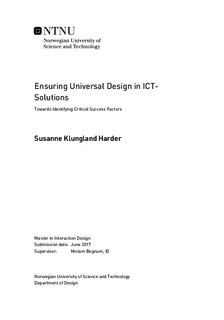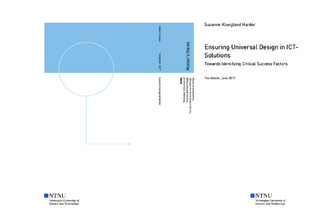| dc.description.abstract | Universal Design (UD) of Information and Communication Technology (ICT) is a fundamental principle that seeks to ensure accessibility for all. With an increasing digitalization of society, there is also a rapidly increasing need for ICT-solutions that are accessible to all. As a consequence, user-centered design and UD has gain popularity steadily over the last decades. Web content accessibility standards and guidelines have been created and UD legislation is in place in several countries. However, research suggests that there are limited insights into the practices regarding implementation of UD in ICT-projects.
This study aims to provide insights into UD practices and verify a set of previously identified promoting and obstructing factors for UD. The study builds on an interview study with 31 individuals affiliated with 21 ICT-projects that have been successful in ensuring UD. The data from these interviews is analyzed in-depth through thematic content analysis, in search for theoretical interpretations that may generate the basis for a proposed best practice for UD in ICT-projects. Second, this study explores the predictability of compliance to the identified factors promoting UD success.
The study identifies 13 promoting and 6 obstructive factors affecting the ability to promote, ensure and achieve UD in practice, spanning four levels external, organizational, project and individual. The findings coincide and expand previous research findings. This study highlights a link between user-centered design, usability and universal design. The main findings promoting UD practices can be summarized in the following six factors; UD Anchoring, Adequate Resources, UD competence and Motivation, UD and Usability Focus, Interdisciplinary Collaboration, and Quality Assurance. The four levels provide insight into factor relationships, and suggest that measures have to be taken at several levels to succeed, particularly how UD anchoring is an important influence on the other factors.
The study prototypes and tests a self-assessment evaluation tool aiming to explore the measurability of ICT projects compliance to the identified promoting factors. The hypothesis being that projects affiliated with UD success will return higher test scores, and projects not affiliated with UD success lower scores. This hypothesis thus the evaluation form s tentative accuracy are as such confirmed, but will need extensive testing in order to be verified. | |

